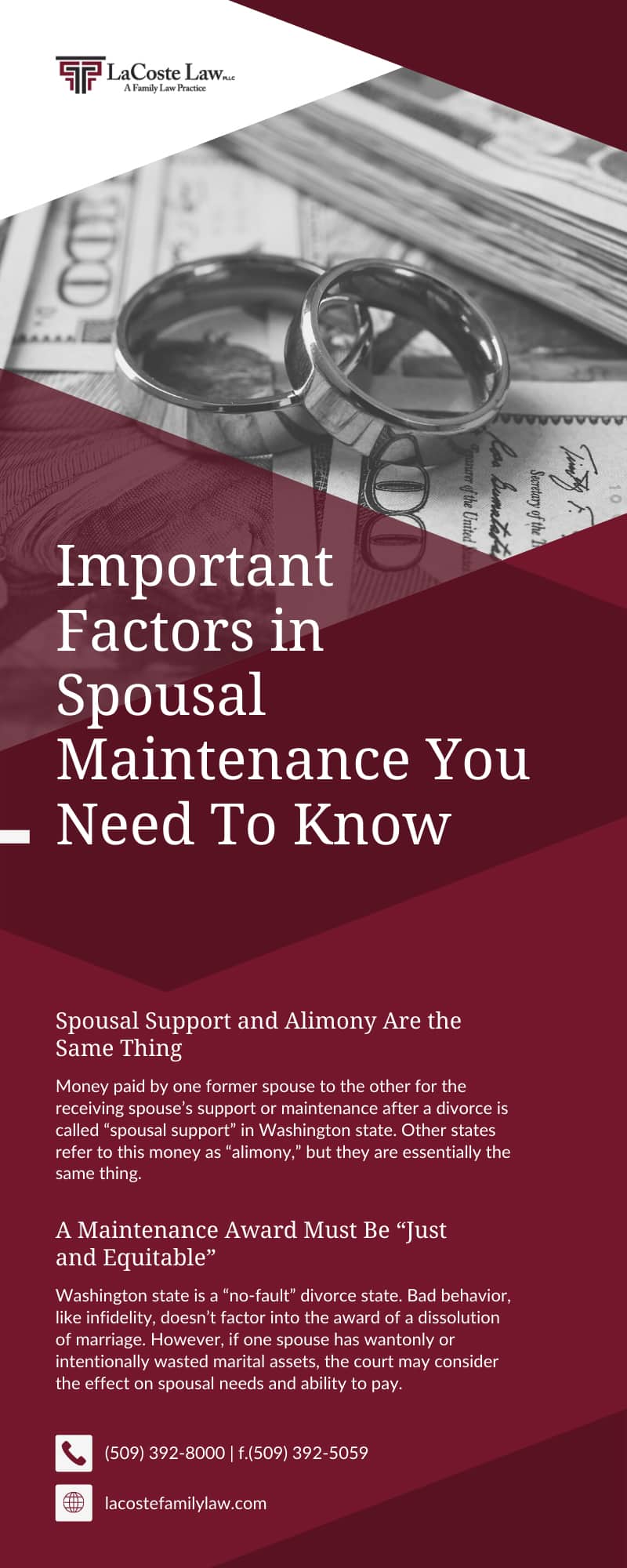
23 Nov Important Factors in Spousal Maintenance You Need To Know
Fights over money are often the biggest fights couples ever have. When couples split, they may argue over whether one partner should support the other financially after a divorce. Courts take several aspects of a couple’s life together to determine whether one partner should support the other. Here are some important factors in spousal maintenance you need to know.
Spousal Support and Alimony Are the Same Thing
Money paid by one former spouse to the other for the receiving spouse’s support or maintenance after a divorce is called “spousal support” in Washington state. Other states refer to this money as “alimony,” but they are essentially the same thing.
Need and Ability To Pay
Washington courts have broad discretion in determining spousal support. However, one important guiding principle is to look at the requesting partner’s need and the other partner’s ability to pay. If the partners can’t agree on a spousal support arrangement, they must bring evidence of need on the one side and ability to pay (or not) on the other.
A Maintenance Award Must Be “Just and Equitable”
Washington state is a “no-fault” divorce state. Bad behavior, like infidelity, doesn’t factor into the award of a dissolution of marriage.
However, if one spouse has wantonly or intentionally wasted marital assets, the court may consider the effect on spousal needs and ability to pay. Examples of wasting material assets include buying a sports car that costs more than the couple’s annual income, running up gambling or credit card debt, or making very risky investments.
The court will also look very unfavorably on a spouse who attempts to hide assets or deliberately accepts under- or unemployment. The same is true of those who otherwise try to change their financial circumstances to avoid paying spousal maintenance.
Washington state law lists factors courts should (but aren’t required to) consider in making awards of spousal support or “maintenance,” as the law calls it.
Section 26.09.090 of the Revised Code of Washington provides that a maintenance order in Washington state can be for any “just” amount and duration. The court must consider “all relevant factors,” excluding “misconduct.” The list of relevant factors in the statute includes (but is not limited to):
- The financial resources of the spouse asking for maintenance. Those resources include their own separate property and any community property allocated to them.
- The ability of the person asking for maintenance to meet their own needs independently. This should take into consideration any amount awarded to them for child support that includes money intended to support the adult.
- The time the spouse asking for support needs to acquire education or training in order to find a job that meets their skills, interests, lifestyle, and circumstances.
- The standard of living the couple maintained during their marriage or domestic partnership.
- How long the marriage or domestic partnership lasted.
- The financial condition of the person seeking support; and
- The ability of the person who would be paying support to meet their own financial obligations while paying maintenance to their ex.
Why Child Support Is Relevant to Spousal Maintenance
When determining spousal support, Washington courts will look at the couple’s parenting plan and take into consideration the amount a spouse receiving child support is getting. Even though child support is for the benefit of the child, those funds will peripherally benefit the parent receiving it. For example, the money may help pay for rent, utilities, and internet access in addition to paying for food, clothing, and recreation for the child or children. There may even be an amount specifically designated for the parent taking care of the child.
How Courts Consider the Length of the Marriage or Partnership
The longer the marriage, the more likely the court is to make an award of spousal support. A partner serving as a stay-at-home parent without the ability or need to work outside the home is likely to win an award of maintenance. This is because they were dependent on the other partner for support during the marriage. A long-term disparity in spousal income can also affect the court’s decision.
Earning Potential
Another important factor in spousal maintenance you need to know concerns earning potential. A lawyer, doctor, or engineer has far greater earning potential than an administrative assistant, waitress, or auto mechanic. A person with a professional degree who elected to work part-time and spend the rest of the time hiking or skiing will still have a better chance of earning more money after the divorce than an ex with less education.
An exception might be if the partner with more education and skills served as a stay-at-home parent long enough for their skills and attractiveness to employers to fade. The court will consider these factors when determining what level of spousal maintenance and which partner would pay it would be “just.”
Types of Maintenance
There are three types of spousal maintenance a Washington state court might award: temporary, short-term, and long-term.
Temporary support is to help a dependent spouse or the spouse with lesser financial means during divorce proceedings. This ensures that a spouse with greater financial assets doesn’t have an unfair advantage in the divorce action and that both spouses can afford expenses while the divorce is moving through the courts. Temporary support ends when the divorce is finalized.
Short-term support is intended to help a dependent spouse get back into the workforce by giving them the financial breathing room to earn a degree, complete vocational training, or take other steps to find employment that would offer sufficient pay to maintain something approximating the dependent spouse’s previous lifestyle.
Long-term spousal maintenance is rare but not unheard of in Washington state. A court may award long-term support to a dependent spouse who is unable to support themselves because of a disability, age, or inability to acquire new skills that would make them employable.
When Spousal Maintenance Ends
When the court awards spousal support, it may specify how long the maintenance payments will last. However, if one of the ex-spouses remarries, registers a new domestic partnership, or dies within the period of spousal support, spousal maintenance is terminated.
Changing an Order for Spousal Maintenance
Parties to a divorce in Washington state can petition the court for a modification in a spousal maintenance order due to a significant change in circumstances, such as retirement, job loss, or a new medical condition or disability that makes maintaining employment difficult or impossible. There is no “one-size-fits-all” definition of “substantial change in circumstances.”
If you are the payer or the recipient of spousal maintenance, and you believe you or your ex has undergone a substantial change in circumstances that requires a modification in a spousal maintenance arrangement, contact an experienced spousal support attorney as soon as possible. Time is of the essence in these circumstances, and delay could cost you, either increasing your obligation to pay or depriving you of payments you should receive. Call LaCoste Family Law today for help with requesting or modifying spousal support.


